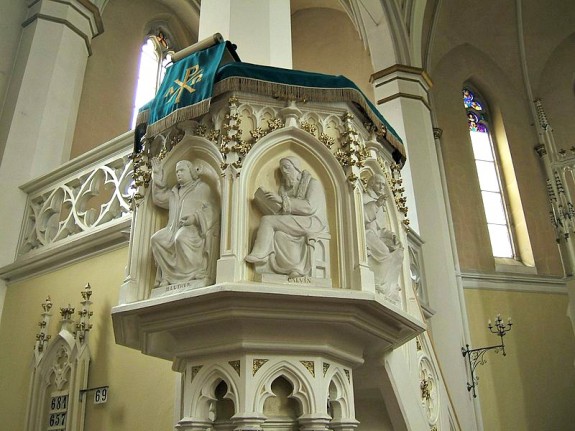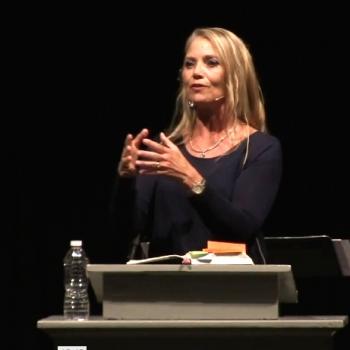Taylor Marshall on Facebook described something he heard at Mass this weekend:
I heard in today’s homily this quote from priest: “Paul was a badass.” It was actually a good sermon but that line threw me off and gave me a chuckle. For context, he was referring to Saul pre-conversion.
Still, I’ve never heard the term “badass” employed in Catholic homiletics. Have you?
Short answer: no.
Longer answer:
Hey, I’m hardly a prude. I’ve said worse—sometimes much worse. But never from the pulpit. And there’s the rub.
I would wager that most of the people in that congregation Sunday morning don’t remember anything else from the Mass except this: “Father said ‘badass’!”
Some probably thought it was cool and appreciated it. A few likely found it distracting. Some, I’m sure, considered it offensive and distasteful.
Preachers, take heed: know your audience. And know the context.
If you’re preaching to a mixed crowd of congregants (and likely a lot of families) on a Sunday morning, think of what they will hear and how they will hear it. (If you’re preaching to residents at Rikers, that’s another matter. I’d still question if the word was necessary.)
But remember: This is the Holy Sacrifice of the Mass, not a campus kegger.
Under most circumstances, know that there are people—maybe many—who will hear a word like that in the pulpit and find it deeply offensive. Know that there are others who will have young children in tow. What will they tell them afterward? Do you want them to have to explain why they should not talk the way Father talked?
Know that it doesn’t take much to distract people from the act of prayer—and everything that happens in the Mass is, in fact, part of the greatest prayer on earth. Distraction can come in many forms—from crude words, careless gestures, or the ridiculous use of unnecessary props in the pulpit. Remember that. Remember what you are doing. Respect that you are being given one of the greatest privileges available—to proclaim the Word of God and share it with others.
If you’re thinking of using a crude word because it will be hip and relevant—don’t.
I remember once when a priest began a homily by alluding to a popular YouTube series, “Where in the Hell is Matt?,” and he quickly apologized, saying, “I don’t mean to be vulgar, but that’s what it’s called…” Respect the sensitivities of the many different sets of ears that are in the pews.
Use common sense. Use good taste. And use this barometer: if you think something might be too vulgar to say in a homily, it probably is.
I’ll conclude with some words of wisdom from the Homiletic Directory, published by the Vatican in 2014:
Because the homily is an integral part of the liturgy, it is not only an instruction, it is also an act of worship. When we read the homilies of the Fathers, we find that many of them concluded their discourse with a doxology and the word “Amen”: they understood that the purpose of the homily was not only to sanctify the people, but to glorify God. The homily is a hymn of gratitude for the magnalia Dei, which not only tells those assembled that God’s Word is fulfilled in their hearing, but praises God for this fulfillment.
Given its liturgical nature, the homily also possesses a sacramental significance: Christ is present in the assembly gathered to listen to his word and in the preaching of his minister, through whom the same Lord who spoke long ago in the synagogue at Nazareth now instructs his people. In the words of Verbum Domini: “The sacramentality of the Word can thus be understood by analogy with the real presence of Christ under the appearances of the consecrated bread and wine. By approaching the altar and partaking in the Eucharistic banquet we truly share in the body and blood of Christ. The proclamation of God’s word at the celebration entails an acknowledgment that Christ himself is present, that he speaks to us, and that he wishes to be heard”
It is very appropriate for a preacher to relate the texts of a particular celebration to the events and questions of the day, to share the fruits of scholarship in understanding a passage of Scripture and to demonstrate the connection between the Word of God and the doctrine of the Church. Like fire, all of these things make good servants but poor masters: if they serve the purpose of the homily, they are good; if they take the place of the homily, they are not. Furthermore, the preacher needs to speak in such a way that his hearers can sense his belief in the power of God. He must not lower the standards of his message to the level of his own personal witness, fearing that he will be accused of not practicing what he preaches. Since he is preaching not himself, but Christ, he can, without hypocrisy, point out the heights of sanctity, to which, like every other individual, in his pilgrim faith he is aspiring.
To my way of thinking, there are millions of valuable words that can be employed effectively for a Sunday homily in a parish setting.
“Badass” isn’t one of them.













